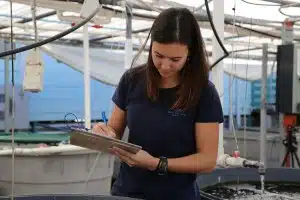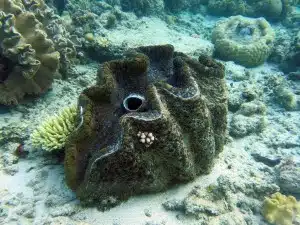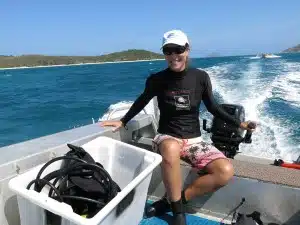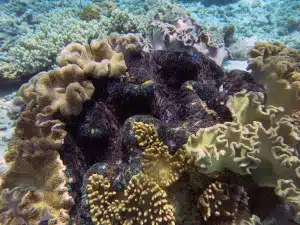
Dr Sue-Ann Watson. Credit: Richard Davis
Queensland researchers have found that maintaining good water quality and light levels in coral reef waters could help endangered giant clams survive in a world of rising carbon dioxide levels.
The warming effect of increasing atmospheric carbon dioxide is well known, but in the last five years there has been a new focus on the effects of that increasing carbon dioxide on ocean chemistry.
As more atmospheric carbon dioxide dissolves in seawater, it makes the seawater less alkali and more acidic—in chemical terms, lowering its pH. This altered chemistry adversely affects marine creatures’ ability to grow shells and skeletons.
Now, research has shown that if high enough levels of light are maintained, ‘solar powered’ marine animals may be able to maintain shell growth even in the more acidic environment.
Dr Sue-Ann Watson of James Cook University found that giant clams were able to survive the effects of moderate ocean acidification as long as sufficiently high light levels were maintained.
“Better access to sunlight lets the symbiotic algae within the clams and corals thrive,” explains Sue-Ann. “And this beneficial effect counters the negative effects that more-acidic seawater has on skeleton growth.”
“Ensuring good access to sunlight is linked to water clarity, runoff from land and the amount of sedimentation from human activities at sea—such as dredging.”
“Increasing ocean acidification is a new challenge for giant clams, which have already become vulnerable from overfishing and overharvesting,” says Sue-Ann. “So, as carbon dioxide continues to rise and sea chemistry continues to change, it will become even more important to manage local impacts such as runoff, and keep reef waters clear enough for sunlight to get through.
Measurements confirm the ocean is now 30 per cent more acidic than it was 250 years ago, and ocean acidity will continue to increase as atmospheric carbon-dioxide levels increase. This is a big change for animals to cope with, and it could become hard for giant clams to grow large enough to reproduce,” says Sue-Ann.
“This work shows it’s important to manage global and local impacts to help protect marine life,” she says.
Sue-Ann presented her research at Fresh Science North Queensland 2015.
Fresh Science is a national program that helps early-career researchers find and share their stories of discovery. Almost 180 early-career researchers nominated for Fresh Science 2015, and this was the first year it was held in Townsville. Fresh Science North Queensland was held at James Cook University (training) and Molly Malone’s hotel (public challenge event).
Fresh Science North Queensland was supported by James Cook University and the Australian Institute of Marine Science.
In addition to taking part in Fresh Science, earlier in 2015 Sue-Ann was named as a finalist in the Eureka Prizes. The Australian Museum Eureka Prizes are Australia’s most comprehensive science prizes. Sue-Ann was one of three finalists for the Macquarie University Eureka Prize for Outstanding Early Career Researcher.
Contact: Sue-Ann Watson, James Cook University, +61 7 4781 5270, sueann.watson@jcu.edu.au

Giant clam. Credit: Sue-Ann Watson

Dr Sue-Ann Watson. Credit: MailieGall

Giant clam. Credit: Sue-Ann Watson


 Fresh Science is on hold for 2022. We will be back in 2023.
Fresh Science is on hold for 2022. We will be back in 2023.